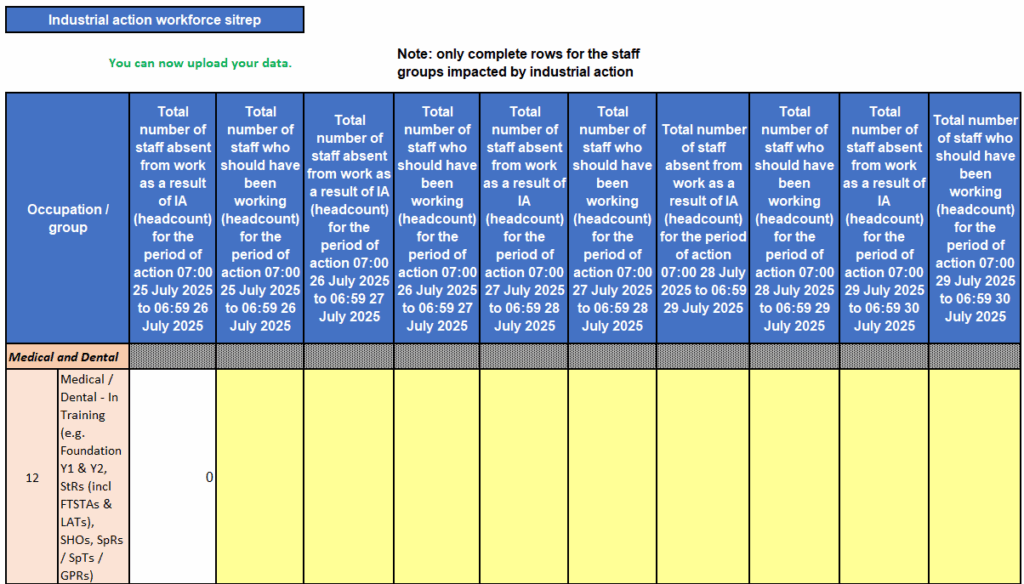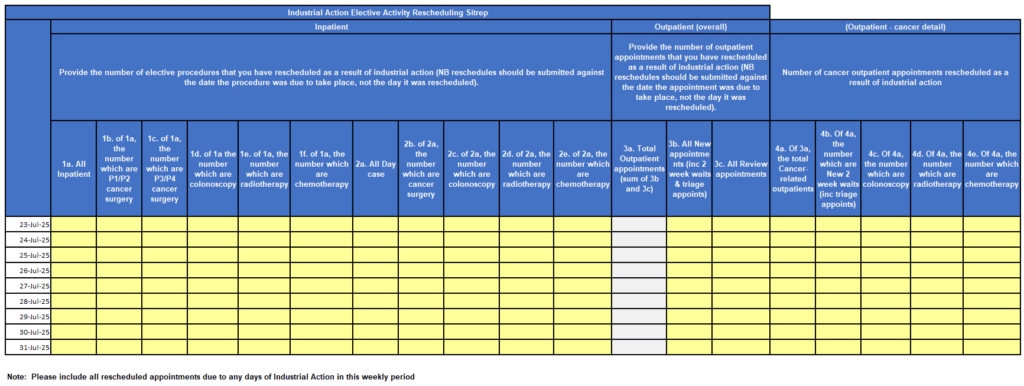To:
Integrated care boards:
- chief executive officers
- chief operating officers
- chairs
- chief people officers (human resource [HR] directors)
- medical directors
- directors of nursing (chief nurses)
NHS trusts:
- chief executive officers
- chief operating officers
- chairs
- chief people officers (human resource [HR] directors)
- medical directors
- directors of nursing (chief nurses)
cc:
Regional:
- directors
- performance and improvement directors
- medical directors
- directors of nursing (chief nurses)
- deputy directors for emergency preparedness, resilience and response (EPRR)
Dear colleagues,
The BMA Resident Doctor Committee has announced industrial action from 7am on Friday 25 July to 7am on Wednesday 30 July 2025. While discussions continue with the BMA, this letter outlines the approach being taken by NHS England ahead of, during, and after industrial action.
Industrial action comes at a very real cost to patients and the rest of the workforce. I know you and many of your colleagues will go above and beyond to try and maintain safe patient services during industrial action.
We all now have significant experience of dealing with industrial action and we ask that you use that existing knowledge to inform planning ahead of this action. This will include moving staff and resources to focus on the following priorities:
- Maintaining emergency care
- Maintaining flow
- Maintaining elective care to the fullest extent possible
- Maintaining priority treatments
It will be important for systems and trusts to try and maintain normal levels of booked activity and consider what is cancelled over the entirety of the cumulative period of disruption (both on days of action and days either side). Particular attention should be given to:
- planning urgent elective surgery (P1 and P2)
- cancer care (particularly for patients who have already been waiting over 62 days, or who are likely to pass day 62 if their appointment needs to be rescheduled)
- long waiters
Reducing volumes of bookings and rescheduling of appointments and other activity should only happen in exceptional circumstances to safeguard patient safety. This should be undertaken in consultation with your NHS England regional chief operating officer.
Reporting expectations
Pre-action
We understand the likely impacts of resident doctor action based upon previous experience. Rather than a full pre-action assurance and assessment, we are asking ICBs to identify and quantify:
- significant service changes, including reduced volumes of planned activity
- patient safety concerns
- risks from concurrent issues
ICBs should share this intelligence with NHS England regional teams and will be advised regionally of this deadline.
During action
On the days of action, trusts and ICBs should consider the impact on patient safety, and aim to mitigate this using normal operational procedures, including escalation of operational pressures escalation levels (OPEL) and actions, and critical incident declaration for operational pressures.
NHS England, via regional teams, will request updates on impacts of any escalating pressures, and respond to operational and critical incident declarations as normal.
No formal industrial action data collections are planned on days of action.
Any concerns about patient safety should be addressed at a local level wherever possible. Where concerns cannot be addressed locally, they should be escalated through normal operational channels to NHS England regional teams.
Post-action
NHS England will conduct 2 SitRep data collections via the Strategic Data Collection Service (SDCS):
- Industrial action workforce SitRep. This will collect numbers of staff taking part in the industrial action, and total numbers of staff due to be at work. This data will be collected once and will open at 9am on Wednesday 30 July 2025 and close at 1pm on Thursday 31 July 2025. The collection will be open for all ICBs and trusts. All organisations are requested to submit data, even if it is a nil return. The template for this can be found in Annex A.
- Industrial action activity. This will collect information on levels of planned activity that have taken place, and activity that has been delayed and rescheduled because of the industrial action. The collection will be open for all acute trusts and will request the figures of rescheduled activity for the period of Wednesday 23 July to Thursday 31 July inclusive. Organisations are requested to submit data, even if it is a nil return. The template for this can be found in Annex B. Guidance for completion is provided as Annex C.
Highlights of the data collected on 30-31 July will confirm the summary position following the period of industrial action and be published on NHS England’s website.
Submissions will be made through the SDCS platform which will open 9am on Wednesday 30 July 2025 and will close at 1pm on Thursday 31 July 2025 and will not be reopened. The template will be available to download from SDCS from 9am on the first day the collection is running. Missing returns will be highlighted to regional chief operating officers for follow-up.
Many thanks for your continued co-operation and support in providing this information and ensuring a high return rate.
Yours sincerely,
Mike Prentice
National Director for Emergency Planning and Incident Response
NHS England
Annex A: Draft workforce SitRep

Annex B: Draft industrial action elective SitRep

Annex C: Guidance for industrial action SitRep collections – July 2025
Rescheduled activity SitRep
| Column name | Guidance |
|---|---|
Date | Specify the day that the appointment was originally planned for |
1a. All Inpatient | A count of all standard inpatient (ie Not Day case) appointment/ procedure scheduled for the specified date that has been changed by the provider due to industrial action. This includes both appointments where a new date has been provided and those where a new date has not yet been confirmed. |
1b. of 1a, the number which are P1/P2 cancer surgery | Of all those in 1a, the number that were for P1/P2 surgeries relating to a cancer pathway. |
1c. of 1a, the number which are P3/P4 cancer surgery | Of all those in 1a, the number that were for P3/P4 surgeries relating to a cancer pathway. |
1d. of 1a the number which are endoscopy | Of all those in 1a, the number that were for endoscopies relating to cancer a cancer pathway. |
1e. of 1a, the number which are radiotherapy | Of all those in 1a, the number that were for radiotherapy. |
1f. of 1a, the number which are chemotherapy | Of all those in 1a, the number that were for chemotherapy. |
2a. All Day case | Any Day Case inpatient appointment/ procedure scheduled for the specified date that has been changed by the provider due to industrial action. This includes both appointments where a new date has been provided and those where a new date has not yet been confirmed. |
2b. of 2a, the number which are cancer surgery | Of all those in 2a, the number that were for surgeries relating to a cancer pathway. |
2c. of 2a, the number which are endoscopy | Of all those in 2a, the number that were for endoscopies relating to a cancer pathway. |
2d. of 2a, the number which are radiotherapy | Of all those in 2a, the number that were for radiotherapy. |
2e. of 2a, the number which are chemotherapy | Of all those in 2a, the number that were for chemotherapy. |
3a. All Outpatient appointments (sum of 3b & 3c) | This is a count of all outpatient appointments/ procedures scheduled for the specified date that has been changed by the provider due to industrial action. This includes both appointments where a new date has been provided and those where a new date has not yet been confirmed. This cell is auto calculated from the contents of 3b and 3c, DO NOT try to enter data directly into this column. |
3b. All New appointments (inc Urgent Suspected Cancer referrals & triage appoints) | Of all those in 3a, how many rearranged appointments are New appointments, including those from an Urgent Suspected Cancer referral including triage appointments. |
3c. All Review appointments | Of all those in 3a, how many rearranged appointments are review appointments. |
4a. Of 3a, all which are cancer-related | Count of all cancer related outpatient appointments/ procedures scheduled for the specified date that has been changed by the provider due to industrial action. This includes both appointments where a new date has been provided and those where a new date has not yet been confirmed. |
4b. Of 4a, the number which are New Urgent Suspected Cancer Referrals (inc triage appoints) | Of all those in 4a, how many rearranged appointments are New, Urgent Suspected Cancer referral appointments, including triage appointments. |
4c. Of 4a, the number which are endoscopy | Of all those in 4a, how many rearranged appointments are for a endoscopy appointment relating to a cancer pathway. |
4d. Of 4a, the number which are radiotherapy | Of all those in 4a, how many rearranged appointments are for a radiotherapy appointment. |
4e. Of 4a, the number which are chemotherapy | Of all those in 4a, how many rearranged appointments are for a chemotherapy appointment. |
Publication reference: PRN02080

